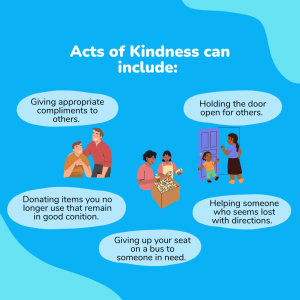Today is Random Acts of Kindness Day, which got us thinking: how are random acts of kindness connected to the work of suicide prevention?
Well, random acts of kindness are simple acts of friendliness or generosity towards another person who we may or may not know. These can be things such as saying “good morning” to others at the bus stop, giving a compliment to a coworker, or letting someone go ahead of you in line at the grocery store.
Research shows that loneliness is increasing, and many people are struggling to develop a sense of meaning or belonging (Statistics Canada, 2021). Loneliness and isolation can contribute to stress, low moods, and

thoughts of suicide. On the other hand, feeling a sense of belonging and developing meaning or purpose in life is known to contribute to resiliency and can act as a protective factor against suicide.
When we participate in acts of kindness, we show others that we see them. We show them that we believe they are worth our energy and time. Simply, we show them that they belong. An act of kindness received by someone who is struggling may give them the opportunity to slow down their thinking, challenge negative thoughts or beliefs (e.g. “nobody ever wants to say hi to me”), and feel a sense of social connectedness. Acts of kindness don’t just benefit those who receive them- they also benefit the “hel
per” or “giver” of the act of kindness. For example, research demonstrates that acts of kindness can lead to improved mood and self-worth, as well as a greater sense of social connectedness for the person providing kindness (Slavich, Roos and Zaki, 2022).
Are random acts of kindness enough to fix all of someone’s problems? Of course not. But a random act of kindness could be the thing that makes someone’s day, that gives them hope in this moment, and encourages them to keep trying. And sometimes, that is just what we need.
Resources for Further Learning:
Lift Up for Suicide Prevention – Centre for Suicide Prevention (suicideinfo.ca)
- Lift-Up is a Buddy Up mini-campaign which focuses on promoting acts of kindness. This resource further explains the role of kindness and social connection as a protective factor and provides some suggestion for acts of kindness.
Kindness Is Action – Born This Way Foundation
- The Kindness is Action Report stems from a partnership between the Born This Way Foundation and the Harris Poll, which surveyed youth in the United States to “explore how young people define kindness, the impact of kindness of mental wellness, and how young people are using kindness to cope with overlapping and ongoing crises.”
Kindness matters guide | Mental Health Foundation
- This Kindness Matters Guide was developed by the Mental Health Foundation U.K. and is “written to demonstrate the positive effect that helping others can have on your own mental health, including some suggestions that will inspire you.”
How Kindness Spreads in a Community (berkeley.edu)
- This article by Jill Suttie explores a new study which found that when we witness kindness, we are also inspired to be kind ourselves.
References:
Slavich, G., Roos, L. and Zaki, J. (2022). “Social belonging, compassion, and kindness: Key ingredients for fostering resilience, recovery, and growth from Covid-19 pandemic”. Anxiety, Stress & Coping, 35(1).
Statistics Canada. (2021). Canadian Social Survey: Loneliness in Canada. Accessed from: https://www150.statcan.gc.ca/n1/daily-quotidien/211124/dq211124e-eng.htm


